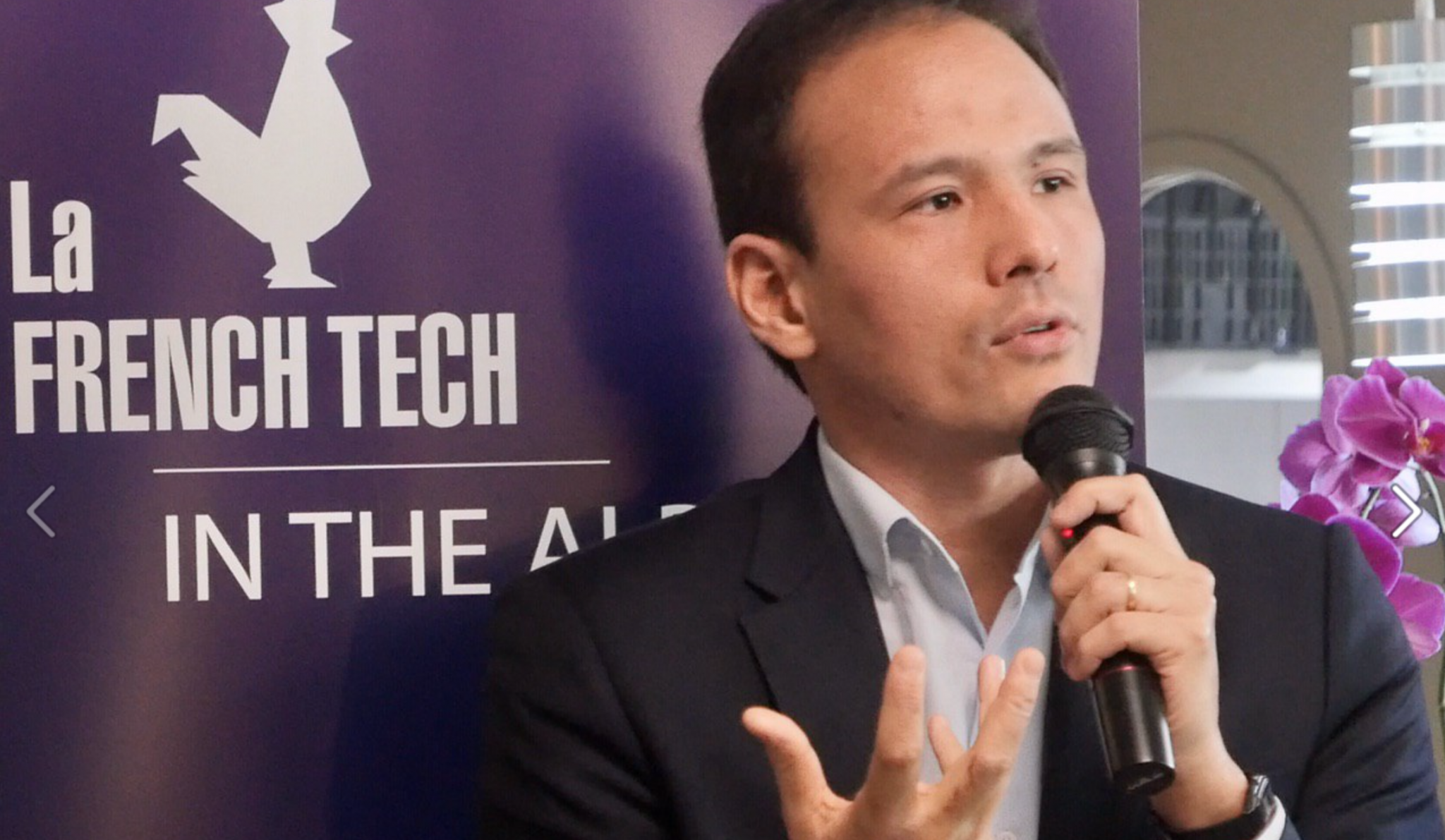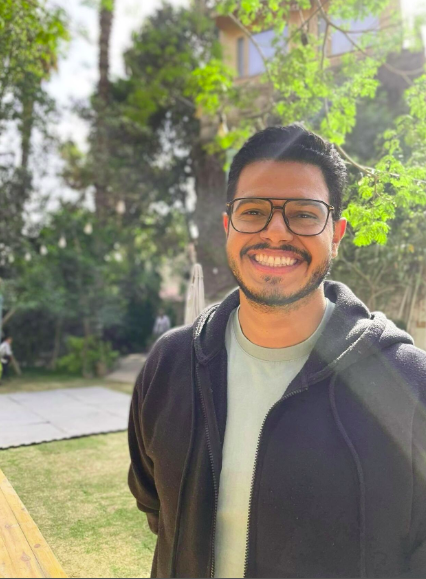When someone’s really hard to pin down, the French say they have an emploi du temps de ministre — a minister’s schedule. Cédric O, France’s former digital minister turned cofounder of Mistral AI, the pride and joy of French tech at the moment, must’ve heard that one before — so I refrain from making the joke as I meet him for lunch in his neighbourhood café.
We are sitting in a cosy light-filled restaurant in the centre of Paris just a five-minute walk from O’s flat. It’s where he does all his meetings now that he gets to WFH (he is working for a tech company, after all). Our hour-and-a-half chat is squeezed between a meeting with his kid’s teacher and a business call.
Yet — unlike myself — O isn’t late. He is already waiting for me, tapping away at his phone, in a relaxed dark jumper-jeans-trainers combo, a clear indication of his switch from ministerial office to startup world.
O is only 40 years old, but he’s already spent five years working in the highest ranks of French President Emmanuel Macron’s government. He now has three hats: he’s one of the cofounders of six-month-old AI startup Mistral, a student at coding bootcamp the Wagon and a member of a government committee on AI. This is on top of being a father of four children, including nine-month-old twins.
It sounds busy to me, but O says that it’s relatively relaxed compared to his time as a minister. “My life has largely changed, thankfully,” he says. “I have more time, but it’s less visible for sure.”
From Élysée to EU
The ex-minister isn’t one for political correctness. Within 15 minutes of our conversation, he’s already told me that he can’t stand Paris anymore — “there’s too much tension, people are aggressive, I don’t want my kids to become little Parisians”. He’s also shared that he’s stopped drinking, is cutting down on meat and trying to stop flying — and that it’s not going down so well with older relatives.
“There are generational tensions around climate and lifestyle choices,” he says. “Yet perhaps if they’d been a bit more careful, we wouldn’t be where we are now.”
His lack of a filter has made O a prominent figure in Brussels in recent months, as the EU wrapped up the last stages of its flagship AI Act — the world’s first comprehensive legislation of the technology. The ex-minister has been pushing hard for the text to stay clear of extra rules that would constrain the growth of Mistral, which is building a large-language model (LLM) — the same technology that powers OpenAI’s ChatGPT.
The final legislation was adopted a few hours after our lunch and although details are still to be ironed out, it includes provisions that are likely to affect Mistral’s business model, including transparency requirements around the training data used by the company that might cause intellectual property issues.
O has been vocal about his frustration that European regulation could “kill” one of the continent’s few shots at having a homegrown challenger to tech giants in the US. As we dig into our starters — roasted vegetables and king prawn skewers — I remind him that his recent lobbying for looser regulation hasn’t escaped his critics given his previous track record.
As a minister, O advocated for some meaty pieces of regulation that he pitched at the time as a way to defend Europe’s digital sovereignty in the face of — mostly US-based — tech giants. He initiated a national 3% tax on large internet companies and then went on to defend the EU’s Digital Markets Act (DMA) and Digital Services Act (DSA), which impose strict rules on platforms like Amazon, Google or Facebook.
Now, with a stake in a tech company that’s reported to be worth more than €2bn, O’s pushback against parts of the AI Act is perceived by some as an eyebrow-raising U-turn. But he won’t have any of it.
“Have I been a minister that represented French tech? Is this coherent with the fact that we need to let Mistral grow? Have I also been a minister that asked for regulation on certain points? And who is saying that I am now asking for no regulation at all?” he asks.
“The problem with this debate is that it doesn’t allow for nuance. All those who are saying I changed my mind, that I am incoherent with my position at the time — they haven’t understood what I’ve been trying to do from the start.”

Macron’s “startup nation”
That start takes us back to a decade ago at HEC Paris, one of the most prestigious business schools in the country. “My father was South Korean, so ever since I was six years old, he’s made it very clear you don’t mess around when it comes to studies,” he laughs, pointing out that his sister went to the equally reputable Ecole Normale Supérieure (ENS).
University was a time of “sociological discovery”, says O, who grew up in a working-class neighbourhood near Lyon, and found himself suddenly rubbing shoulders with the Parisian elite — the country’s future political establishment and big business founders.
This is when he met Stanislas Guerini, now the French minister of the civil service. In 2006, the pair joined the ranks of prominent socialist politician Dominique Strauss-Kahn. His network from the time led him to be one of the first five people to join “En Marche!”, the party of political upstart Emmanuel Macron.
With Macron’s win in 2017, O joined the government as an advisor to the president. Just two years later, he became digital minister.
At that point, the French tech ecosystem was showing some encouraging signs of activity — local social media darling Zenly had been bought by Snap, Spotify competitor Deezer had been minted a unicorn; but with Macron in charge, who was elected with the promise to make France a “startup nation”, things accelerated significantly.
O says that the young president — who wasn’t even 40 years old at the time — believed competing against the US and China would require innovating, and innovation would come from startups.
“That’s something Macron profoundly understood, and he was one of the few people who did,” says O. “That’s what changed. He talked the talk and walked the walk.”
The fall of Europe
What keeps O up at night is how little faith he has that the continent will keep up in this innovation race with the US and China.
“There is nothing indicating that Europe couldn't be completely marginalised in the next decades,” he casually drops as he gets started on his main dish, pulling parts of an oven-roasted aubergine from under a decadent ricotta stuffing.
Almost as if timing it to chime in with his first mouthful, he adds: “As the president says, you’re either at the table or on the menu.”
And for O, Europe is not at the table. “Europe can regulate, but who is setting the standards? Those who are shaping the world are big US tech companies, not European regulators,” he says.
It speaks for itself, he adds, that one of the EU’s biggest achievements is to have created the General Data Protection Regulation (GDPR) rather than having enabled the emergence of a single European tech leader.
The GDPR is now widely accepted as a world standard and it has even been emulated in other countries, including the US; but O argues that for all its benefits, it is not the right strategy.
“I’m very happy with the GDPR but in the long term, I think a European Google, SpaceX or OpenAI would do a much better job of defending our European values than the GDPR,” he says.
O maintains that contrary to how he’s been described in recent months, he isn’t against regulation. But he argues that Europe is entirely focused on putting brakes on new technologies — and is not allocating sufficient time and resources to growing companies that will ensure the continent remains independent from the monopoly of foreign players.
The EU has a long list of initiatives designed to support startups, from financial backing from the European Investment Fund (EIF), the region’s most prolific backer of VC funds, to programmes like the High-Performance Computing Joint Undertaking (EuroHPC-JU), which provides startups with access to supercomputing and quantum computing capabilities.
But the continent's attempts to position itself as a tech leader aren't sufficient, according to O. “We're pretending we are in the game but we aren't taking the decisions that are coherent with that. It's innovation-washing,” he says.
His diagnosis? The problem comes from Europe’s mentality, which isn’t set to win. “Europe is scared of everything,” he says. “[Europeans] are devoured by a millenarian vision that thinks the only thing left to do is to regulate and protect ourselves.”
“But geopolitics and technology, it’s a war of movement, not of position. The last time France thought it had solved its problem by taking shelter behind the Maginot line, it didn’t end so well.”
O says that he feels inspired, thanks to his father’s heritage, by the history of South Korea — a country that was among the poorest in the world following the war in the early 1960s and which grew, in only 50 years, into a global superpower.
“It’s a country that rolled up its sleeves, looked to the future, worked and believed in itself,” says O. “South Korea has its own problems, but it is fundamentally better prepared to face the challenges of this world than Europe — and that saddens me.”

Sort of lobbyist turned founder
It’s been a lengthy answer to the question of whether O’s defence of Mistral’s interests aligns with his former priorities as a minister.
“I’m fighting for European and French startups because they are our future. I did it in government, now I am doing it for Mistral because I think the future of companies like Mistral is part of the public interest,” he says.
I ask if he considers himself a lobbyist; the answer comes quick and clear: “No.”
O explains he was drawn to Mistral a few months ago first and foremost because of the ambition of its founders Arthur Mensch, Timothée Lacroix and Guillaume Lample, Meta and Deepmind alumni.
But it quickly emerged that the French startup, which currently counts a team of 20 people, mainly scientists, would be facing the business, regulatory and media hurdles of a tech company the size of Meta or Google.
This is where O’s experience can make a difference. But the ex-minister is clear that he didn’t leave the government to continue being at the heart of political debates.
“I am doing this because it is essential and if no one does it, they will literally die,” says O.
He confesses that he left politics primarily because he wanted to start or take over a business — to join the ranks of “doers” rather than stay with those making the rules. He’s already got an idea for a company — but “it’s too early to say anything”.
As we sip our espressos, I ask him if he thinks he’ll ever go back to working for the government.
“I didn’t leave thinking I’d come back,” he says. “But I’m only 40 years old. Will I want to do politics again in 20 years? I have no idea.”
“It’s not at all in my plans — if only because I have four children and life is short.”
Update: This article was amended on December 21 to clarify that O did not specifically describe the EIF and EuroHPC-JU as "innovation washing".


